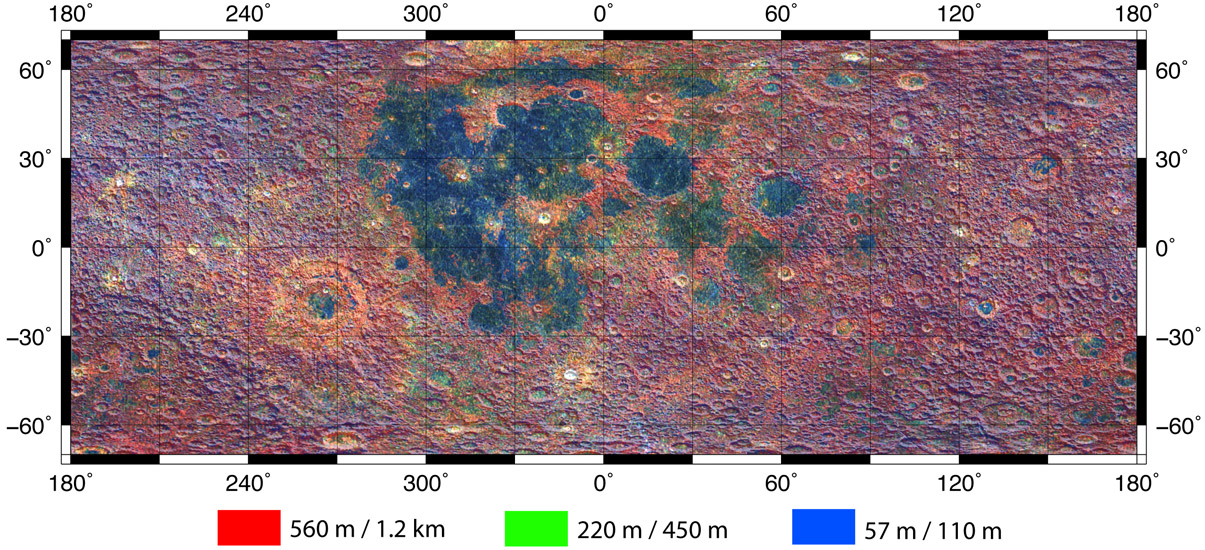Difference between revisions of "May 14, 2011"
| Line 3: | Line 3: | ||
<!-- ws:start:WikiTextHeadingRule:0:<h1> --> | <!-- ws:start:WikiTextHeadingRule:0:<h1> --> | ||
<!-- ws:start:WikiTextLocalImageRule:6:<img src="/file/view/LPOD-May14-11.jpg/228369042/LPOD-May14-11.jpg" alt="" title="" style="width: 1000px;" /> -->[[File:LPOD-May14-11.jpg|LPOD-May14-11.jpg]]<!-- ws:end:WikiTextLocalImageRule:6 --><br /> | <!-- ws:start:WikiTextLocalImageRule:6:<img src="/file/view/LPOD-May14-11.jpg/228369042/LPOD-May14-11.jpg" alt="" title="" style="width: 1000px;" /> -->[[File:LPOD-May14-11.jpg|LPOD-May14-11.jpg]]<!-- ws:end:WikiTextLocalImageRule:6 --><br /> | ||
| − | <em>image by [http://www.nasa.gov/mission_pages/LRO/news/moon-wrinkles.html | + | <em>image by [http://www.nasa.gov/mission_pages/LRO/news/moon-wrinkles.html Meg Rosenburg and colleagues] (JGR and NASA)</em><br /> |
<br /> | <br /> | ||
Any complex map, like this one that shows slopes of terrains at different scales, takes some study to understand. <br /> | Any complex map, like this one that shows slopes of terrains at different scales, takes some study to understand. <br /> | ||
| Line 15: | Line 15: | ||
bluish floors. Compton has lavas on its floor, but the other two have smoothness that may be due to impact melts.<br /> | bluish floors. Compton has lavas on its floor, but the other two have smoothness that may be due to impact melts.<br /> | ||
<br /> | <br /> | ||
| − | <em>[mailto:tychocrater@yahoo.com | + | <em>[mailto:tychocrater@yahoo.com Chuck Wood]</em><br /> |
<br /> | <br /> | ||
<hr /> | <hr /> | ||
Revision as of 17:34, 11 January 2015
Colorful Roughnicity

image by Meg Rosenburg and colleagues (JGR and NASA)
Any complex map, like this one that shows slopes of terrains at different scales, takes some study to understand.
Basically the three colors indicate roughness at different scales. Red areas are rough over distances of about a
kilometer, green represents a few hundred meters, and blue is tens of meters. The the mare are generally smooth
until small scales are considered - mare ridges and small crater rims typically have relief of 10s of meters. At the
other end of the scale are Tycho, Copernicus and a few other very fresh craters with yellow-white interiors. These
are rough at all scales from the high crater walls to cracks in the impact melt covered floors. Notice the less dark
hues that surround Tycho and map out the continuous ejecta blanket. Now look at what circles the Orientale
Basin. Some of the oddest craters are ones like Aristoteles, Langrenus and Compton that have yellow rims and
bluish floors. Compton has lavas on its floor, but the other two have smoothness that may be due to impact melts.
Chuck Wood



